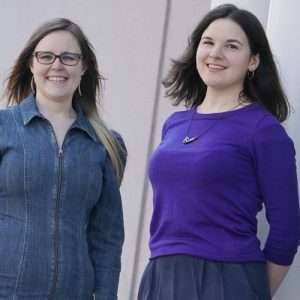
We spoke to Emily Rogers, COO and co-founder of climate-tech scaleup Reath, to discover more about where they are on their entrepreneurial journey, the real-world impact they are seeking to make and how the AI Accelerator, the University of Edinburgh and the DDE programme have played a role in helping them connect their ideas to the world.

Claire Rampen and I met at university when we were running a Student Arts Festival, and we found that we loved working together. Later, from working in and around start-ups, Claire and I caught ‘the data bug’, while getting frustrated that our brains weren’t being used to work on projects that we felt passionate about and that all our environmental efforts were only individual. So in 2019, to tackle both frustrations, we co-founded Reath.
We want to address the global climate crisis by changing the way that businesses use plastic. Plastic is not the bad guy, we just use it in the wrong way. We want Reath to create a system where resources aren’t being wasted, where they’re kept in the loop longer, and we get more value out of them.
Reath is a circular economy software company that incorporates the concept of digital passports, that when linked, enable companies to operate circularly and reuse things like packaging while meeting health and safety standards. We use data to map the journey of plastic products.
We wanted to create a business for good, to make a difference and use our brains in a way that felt meaningful. Starting your own company also gives you an opportunity to build an inclusive culture where everyone can be open and come to work as themselves.
Instead of looking at success and failure, we like to talk in terms of experimenting. With experiments, if things don’t go well, instead of feeling like it’s a big failure, we see it as a learning opportunity.
The Accelerator has pushed us to think about the wider picture. It’s been so helpful to get involved with a community of businesses that are both local and data-driven, as there is a shared level of understanding here that we haven’t experienced before. I’ve met great mentors on the programme too, which has opened up new opportunities and allowed me to learn from people who have already built a data driven business.
In Edinburgh, there is huge momentum and potential. Being in a slightly smaller ecosystem means that we have seized so many more opportunities. Even though you’re competing for these opportunities, there is an incredible sense of community, and I love it. It feels like people really want to be on the cutting-edge for the greater good!
We are soon going live with our first big retail client, and then we want to replicate it across other clients. Later this year we also hope to raise more funding.
